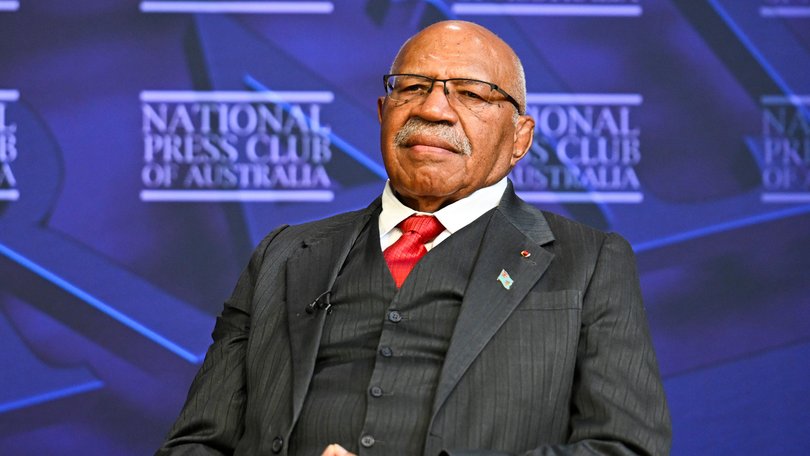Fiji prime minister Sitveni Rabuka confirms he would oppose a Chinese military base in Fiji

Fiji would oppose China expanding its security presence by setting up a military base in the Pacific Islands, Fijian Prime Minister Sitveni Rabuka confirmed on Wednesday.
“Who would welcome them? . . . Not Fiji,” he responded candidly when asked about the possibility of a future Chinese base at an event at the National Press Club in Canberra.
Fiji and other Pacific Island nations lie at the heart of rivalry between China and the United States as they jostle for geostrategic influence.
Sign up to The Nightly's newsletters.
Get the first look at the digital newspaper, curated daily stories and breaking headlines delivered to your inbox.
By continuing you agree to our Terms and Privacy Policy.The potential for the Chinese military to gain a permanent foothold on Australia’s doorstep was raised when the Solomon Islands signed a secretive security pact with Beijing in 2022, although China has denied it has any such ambition.
Mr Rabuka said he would be prepared to use his influence as prime minister to prevent the establishment of a Chinese base in the region, but added that China did not need a facility to project power as it had already tested an intercontinental ballistic missile in September that flew over Fiji to land in international waters.
Mr Rabuka said he was concerned about “geostrategic tensions” and the prospect of a region “driven by division in security and instability”.
In a speech that set out Fiji’s own vision for an “Ocean of Peace Treaty” that would counter coercion and ensure respect for Pacific sovereignty, he also warned that the region’s outlook was “more uncertain than at any time since Fiji’s independence in 1970”.
The country did not wish to be caught in the middle of great power competition, stressed Mr Rabuka.
“We do not want those superpower rivalries or big power rivalries to be played out in the Pacific,” he said.
The Prime Minister praised Chinese President Xi Jinping as a “great leader” who had improved living standards and the economy, but also acknowledged China’s growing regional ambitions.
“Right now, we are having to cope with a China that is big, really big and has gotten powerful and would probably like to spread its influence in the Pacific,” he said.
Pacific leaders were trying to pursue policies that are “friendly to all and enemies to none” even though it was a “fairly tough course to steer,” he stressed.
Mr Rabuka talked warmly of the bilateral Fiji-Australian relationship, indicating Suva was open to elevating its relationship with Canberra to a treaty-level partnership and ready for its citizens to join the ranks of Australia’s defence forces.
He said a treaty, which would incorporate development assistance, would secure ties beyond “the political whims of winning parties” in elections in both countries.
Canberra is currently pursuing a defence treaty with Papua New Guinea that would lead to its citizens being eligible to serve in the Australian Defence Force.
The Prime Minister also gave a frank prognosis of the consequences of China’s ambitions to take over Taiwan.
Beijing has not renounced force in its intentions to seize Taiwan, a democracy of 23.5 million with its own government, and which has never been ruled by the Chinese Communist Party.
The Pacific would be impacted by any conflict over the Taiwan Strait between major powers, a possibility already being planned for by China and other nations, he said.
“If there was an escalation of conflict in China across the strait, it would be felt and it will draw the major powers together into a conflict,” he said.
“We have planned on the possibility of it happening.”

